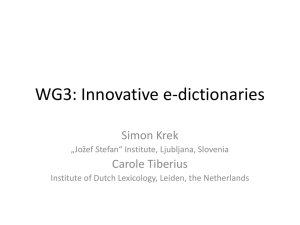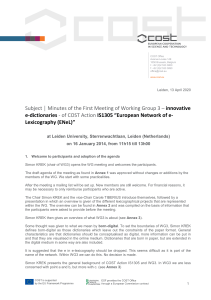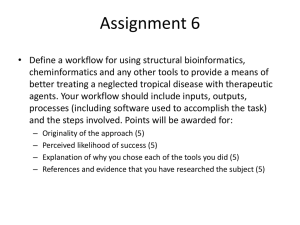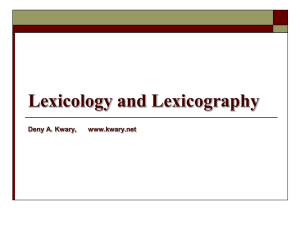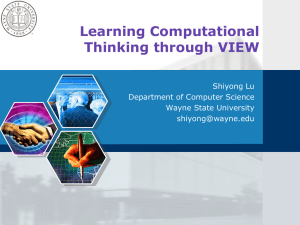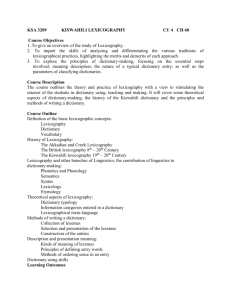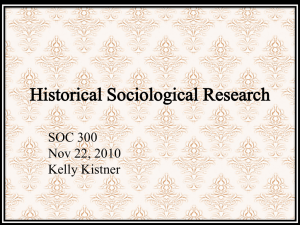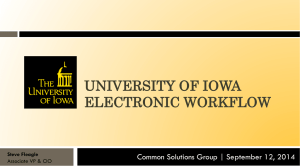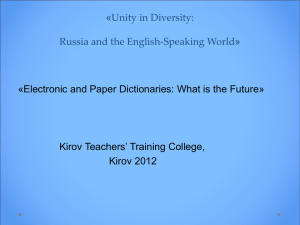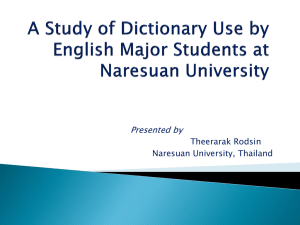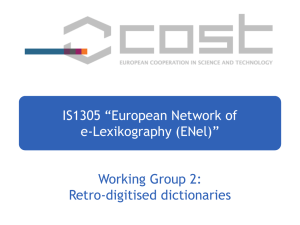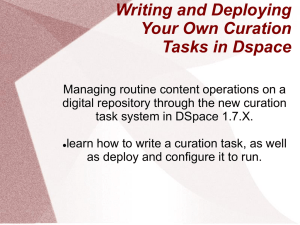Annex 4: Meeting powerpoint presentation
advertisement
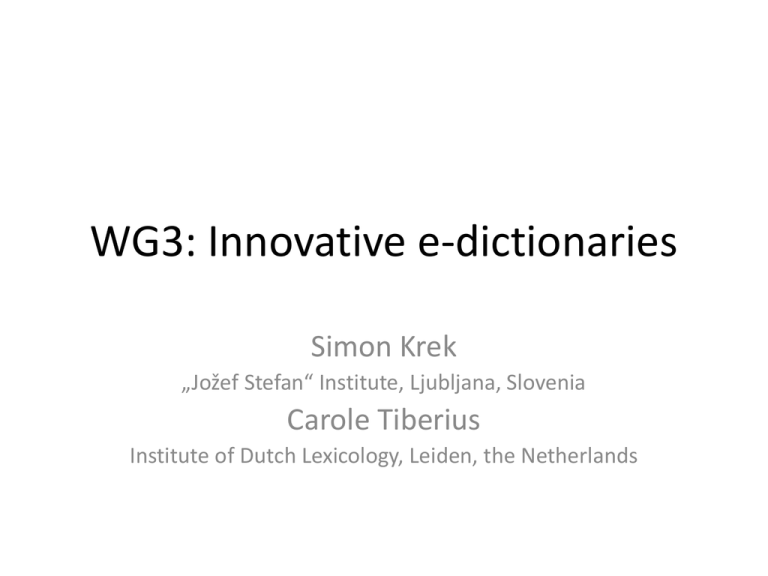
WG3: Innovative e-dictionaries Simon Krek „Jožef Stefan“ Institute, Ljubljana, Slovenia Carole Tiberius Institute of Dutch Lexicology, Leiden, the Netherlands Programme • • • • • 11:15-11:35 11:35-12:15 12:15-12:40 12:40-12:50 12:50-13:00 INFO & PRACTICALITIES WORK PLAN & TIME-TABLE TASKS FOR BOLZANO THE LORENTZ CENTER AOB AND CLOSING PRACTICALITIES • short introduction and presentation of the chair and vice-chair • overview of countries (and dictionaries) represented in WG3 • topics - what do we mean by an innovative edictionary in WG3? • sharing tasks • e-publications WG3 chair – Simon Krek • employment • • • • • 1994-2004 2005-2007 2008-2013 20072013- DZS Publishing House, dictionary editor Faculty of Arts, Uni-Ljubljana Amebis, d.o.o., Kamnik Jožef Stefan Institute Faculty of Social Sciences, Uni-Ljubljana • projects • 1995-2006 • 1996-2000 • 2005-2006 • 2008-2013 The Oxford®-DZS Comprehensive EnglishSlovenian Dictionary, editor-in-chief FIDA Corpus, coordinator FidaPLUS Corpus, coordinator Communication in Slovene, coordinatior Communication in Slovene project (2008- 2013) WG3 vice-chair – Carole Tiberius 1992 1995 2001 2001-2006 2006- degree in translation (Russian-French), Antwerp, BE MA in computational linguistics, Nijmegen University, NL PhD in Multilingual Lexical Knowledge Representation, Brighton University, UK Research fellow Surrey Morphology Group, Surrey University, UK Computational linguist (ANW, Taalportaal) Instituut voor Nederlandse Lexicologie (INL) Working group 3 • WG3 Innovative e-dictionaries: This WG will coordinate the development of born-digital dictionaries, focusing on the latest developments in e-lexicography and the interface between lexicography and computational linguistics. General background • (c) In the past few years, innovative electronic dictionaries have been created that no longer resemble traditional paper dictionaries but try to fully exploit the new possibilities of the digital medium. General background ctd. • Though serious attempts have already been made at embedding electronic lexicography into a theoretical framework, a new research paradigm and common standards for electronic lexicography are still lacking. • And so are common standards and cooperation for the interlinking of the content of digitized dictionaries and innovative edictionaries. Scientific focus • (b) mapping current and possible future trends for the creation of born-digital dictionaries, focusing on the latest developments in e-lexicography and the interface between lexicography and computational linguistics • (d) exploring the possibilities of extensive linking of dictionary content from different European languages Other WGs • In this WG, requirements from WG1 dealing with linking information between dictionaries and with the user interface will be taken into account. • Interaction will also take place with WG4 to be able to take into account the new insights into the lexicographical description of the vocabularies of the different European languages. WORK PLAN & TIME-TABLE • topics (from the original proposal) • meetings (6) – results – outputs • training school (year 3) Topics 1. description of the workflow for corpus-based lexicography 2. overview of existing software needed in this workflow 3. Dictionary Writing Systems (and Corpus Query Systems) 4. Analysis of the possible impact of automatic acquisition of lexical data (distributional thesauri etc.) 5. Analysis of the interface between dictionaries and computational lexica (cf. wordnets) and syntactically and semantically annotated corpora (Framenet, Semcor, Senseval) 6. Investigation of possible use of dictionary content for computational linguistic applications July 2014 • Workflow of corpus-based lexicography; Software to support lexicographical workflow (DWS and CQS, also backup, version control etc.) • responsibility: – Carole Tiberius • result: – better understanding of the workflow (including an overview of software that is necessary for a smooth workflow) which results in better planning of future projects January 2015 • Software to support lexicographical workflow: DWS and CQS • responsibility: – Simon Krek • result: – description of DWSs and in particular the newly developed (web) applications for querying corpora July 2015 • Automatic acquisition of lexical data and its impact (what works, what doesn’t work – example sentences, collocations, neologisms, definitions, word senses) • responsibility: – Carole Tiberius • result: – exploring the possibility of automation of particular tasks within corpus-based lexicography as support to lexicographers / lexicographical workflow January 2016 • Between Corpora and Dictionaries – analysis of the interface between dictionaries and computational lexica and corpora • responsibility: – Simon Krek • result: – exploring the possibiltiy of collecting lexically and semantically organized data in a completely automated process where the data could be used for immediate visualization for human users interested in lexical behaviour of words July 2016 • The use of lexicographical data in computational linguistics – investigation of possible use of dictionary content for computational linguistic applications • responsibility: ? • Result: – better understanding of the need of computational linguistic community for lexicographically organized data and vice versa Other topics • presentation, layout, design issues of edictionaries as well as access routes? • which other topics do we miss? • is the proposed order of the topics OK?
